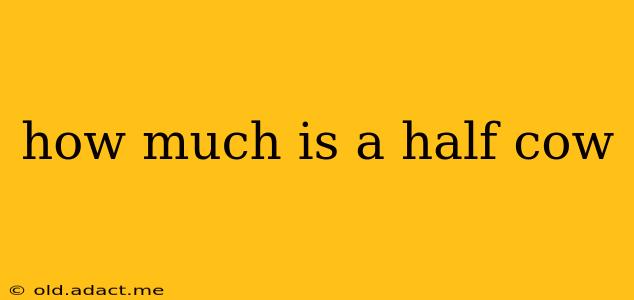How Much is a Half Cow? A Comprehensive Guide to Buying Beef in Bulk
Buying a half cow can be a fantastic way to save money and enjoy high-quality beef, but the cost varies significantly depending on several factors. There's no single answer to "How much is a half cow?" This guide will break down the influencing factors and help you understand the potential price range.
What Factors Determine the Price of a Half Cow?
Several key factors influence the final cost of a half cow:
-
Breed of Cattle: Different breeds of cattle have different characteristics, impacting meat quality and price. Angus beef, known for its marbling and flavor, typically commands a higher price than other breeds.
-
Weight of the Cow: A larger cow will naturally yield more meat, increasing the overall cost. Prices are often quoted per pound of hanging weight (the weight of the carcass before butchering).
-
Processing Fees: These fees cover the butchering, cutting, wrapping, and freezing of the meat. Costs vary significantly by location and the services offered (e.g., custom cuts).
-
Location: Geographic location plays a significant role. Rural areas may have lower prices than urban locations due to lower overhead costs for the farmer and butcher.
-
Seasonality: Prices can fluctuate depending on the time of year and market demands.
-
Type of Processing: The level of processing you choose impacts the final cost. Some buyers opt for custom cuts and packaging, which adds to the expense.
How Much Can I Expect to Pay?
Providing an exact price is impossible without specifics. However, a reasonable estimate for a half cow (hanging weight) in the US could range from $1,000 to $3,000 or more. This broad range highlights the importance of the factors discussed above. You'll need to get quotes from local farmers and butchers to determine a precise price in your area.
What are the typical cuts of meat included in half a cow?
A half cow typically yields a variety of cuts, including:
- Roasts: Chuck roast, rib roast, sirloin roast, etc.
- Steaks: Ribeye, strip steak, sirloin steak, tenderloin, etc.
- Ground Beef: A significant portion of ground beef is usually included.
- Stew Meat: Great for slow-cooking dishes.
- Short Ribs: Excellent for braising or grilling.
- Other Cuts: Various smaller cuts like brisket, flank steak, etc.
The exact cuts and quantities will vary depending on the cow's size and the butcher's practices.
How can I find a local farmer to buy from?
Finding a local farmer is often best done through word-of-mouth, farmers' markets, or online searches. Look for farms that offer direct-to-consumer sales of beef. Many farms also sell shares in whole or half cows, allowing several customers to share the cost.
What are the advantages of buying a half-cow?
-
Cost Savings: Buying in bulk generally results in a lower cost per pound of beef compared to buying retail cuts.
-
High-Quality Meat: You often get access to higher-quality, locally raised beef.
-
Control over Sourcing: You know where your meat comes from and how the animals were raised.
-
Variety of Cuts: You receive a diverse range of cuts, allowing for many different meals.
What are the disadvantages of buying a half-cow?
-
Storage Space: You'll need significant freezer space to store a half cow's worth of meat.
-
Initial Cost: The upfront cost can be substantial.
-
Commitment: You're committing to a large quantity of meat.
Buying a half cow is a significant undertaking. By carefully researching local options and understanding the factors affecting price, you can determine if it's the right choice for your family's needs and budget. Remember to get multiple quotes and ask plenty of questions before committing to a purchase.
